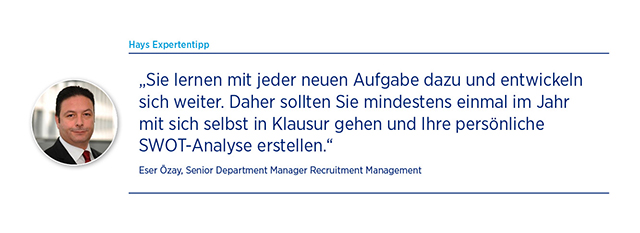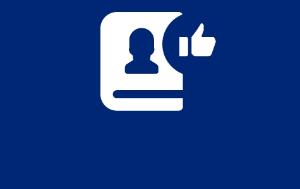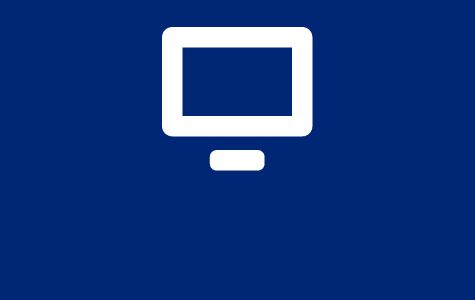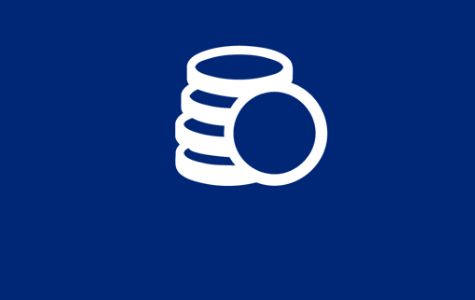This is how to find out your strengths and weaknesses for your interview
Due to optimal application documents, you have an important job interview in your schedule in the next few days? Then it's time to get to grips with your strengths and weaknesses. This is essential for your self confidence and your ability to convince your future employer that you are the correct choice.
Even if the question about your strengths and weaknesses seems somewhat old fashioned, it’s guaranteed to pop up in some shape or form during your next interview. The questions targeting your strengths and weaknesses are often concealed behind supposedly simple questions such as: “How can you contribute to the company’s success?” or “What tasks were particularly challenging for you in your last job?”.
A personal SWOT analysis (Strengths, Weaknesses, Opportunities, Threads), i.e. a comparison of your strengths, weaknesses, opportunities and threads, helps you to prepare in depth for typical questions and to present your character traits in the interview.
Your personal SWOT analysis for your job interview
Let's get one thing out of the way: A SWOT analysis can only work if you are honest with yourself, and assess your skills in an objective a way as possible. If you have difficulties identifying your strengths, weaknesses, opportunities and threads, speak to friends, acquaintances or even close colleagues. They can often evaluate strengths in a different way to you. Don’t shy away from confrontation with your strengths and weaknesses. You won't benefit from mentioning positives that you don’t have or simply sweeping negative points under the table during the interview.
In order to prevent you from obsessing over your concrete strengths and weaknesses, it helps to ask yourself different questions which come up with the same answers. Simply ask yourself: Which activities do you enjoy, and which ones would you rather do away with? Your strengths and weaknesses will often lie hidden in the answers. Because: Things that you enjoy are things that you are good at.
A look back at previous appraisals or notes from one-on-one interviews can help you to define your strengths and weaknesses more clearly for your next interview. Go over all of these points in your SWOT analysis, and supplement them with your opportunities and threads.
In the section for opportunities in your personal SWOT analysis, add everything which concerns positive external circumstances and which you can use to your advantage in your career. For example, opportunities which your new job offers you. These are best combined with your strengths. You should also emphasise your interest in the position in the interview. For example, if one of your strengths is openness, you can emphatically show that you can integrate quickly into new teams and take on new tasks.
In contrast to opportunities, threads refer to negative external circumstances that you cannot change. But there is often a way of at least reducing these. For example, it will occur time and time again that you have too much work to do at one time, leaving you at risk of being overworked. But you can minimise these threads with your strengths: For example, good time management, discipline or structures which you have come up with yourself.
In the interview itself there will be moments where you can incorporate the results on your SWOT analysis. You should always make the connection to important aspects of the job description and ask about points which you are not one hundred percent clear about.



Using your strengths and weaknesses in the interview
The question about your strengths and weaknesses in an interview is one that you should be able to answer confidently. Present yourself in the best light, and have possible answers at the ready. However, you must ensure that your answers apply to the questions which are asked in the interview.
Strengths in the interview
Go into your soft skills and hard skills when you are explaining your strengths. On the one hand, you will both show which qualities and skills make you an ideal candidate for the position, and on the other hand you will show your characteristic traits in the interview on the basis of your soft skills. In this way, your future employer can better evaluate how you will fit into the team and influence it with your personality.
The most frequently used soft skills include:
- Communication skills
- Self-confidence
- Team skills
- Empathetic
- Ability to deal with conflicts
- Able to accept & give criticism
- Independence
- Creative
- Time management
Hard skills include:
- Degree
- Language skills
- IT skills
- Software skills
- Special proven skills like programming languages, driver’s licences, other qualificationsn
However, when you mention your hard and soft skills, you must ensure that they suit you and your abilities. Because sooner or later, the extent to which you really master the capabilities which you have mentioned will come out.
Weaknesses in the interview
Hand on heart: What are your biggest weaknesses? No one likes admitting that they can't do something. But weaknesses are also not necessarily about how “bad” you are. On the contrary, you can show how you work around your weaknesses. You might even be able to convert your weaknesses into strengths. Or even be self-critical and say: “Yes, I want to improve myself in this particular area.” This personal desire for improvement tends to have a very impressive effect on an employer.
What is important is to be realistic about your weaknesses in the interview. Show that you know where your weaknesses lie and how you relate to them. You won't throw yourself onto the “no” pile by saying “I sometimes find it hard to say no, and want to take on every task at once. But sometimes I overdo it.” This shows that you are very helpful and a little overtime is OK once in a while.

But be careful with your openness and weigh up exactly which weaknesses are okay to share, and which ones would be a problem for someone working with you. For example, if you are a notoriously latecomer, it might be better not to mention that to your potential employer.
Always consider: Showing your strengths and weaknesses in the interview is particularly important for your interviewer. Because they can look up your qualifications and career background from your CV and your application. However, these do not mention how you react to failures, how you would describe your own personality or how you organise your everyday work. You should therefore use the interview to mainly impress them with your character.

Tips and tricks for making an initial personal impression
In the interview, show that you have researched the company and that you are the perfect person for the job you are applying for.

How to have a successful video interview
Digital interviews can be particularly challenging, since personal interaction goes out of the window. Find out how you can impress your interviewer digitally in spite of this.

Get the best out of it
Did the interview go well, and you now have to negotiate your salary? We’ll help you to put yourself in a good position.
